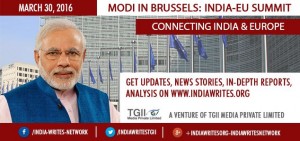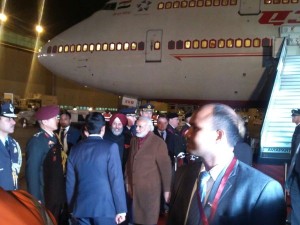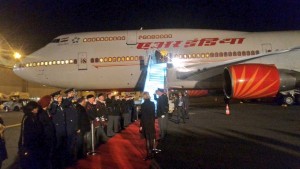Diplomacy, Democracy, Development, Diamonds and Diaspora – these five Ds will coalesce with business and technology to mint afresh a new vocabulary of re-energising India’s multi-faceted engagement with Belgium and the 28-nation European Union during Prime Minister Narendra Modi’s first visit to Brussels. It’s a day-long visit, but within a span of less than 18 hours these varied strands of India’s partnership with the EU will reconfigure a roadmap for upscaling this vital partnership across-the-board, including strategic, economic and cultural. These multiple facets of the India-EU relationship are reflected in a set of back-to-back engagements Mr Modi has with the leaders of Belgium and the EU separately on March 30.
The 13th India-EU summit, which is being held after a gap of five years, will end diplomacy deficit between the world’s fastest growing economy and the world’s economic powerhouse, which continues to retain its competitive edge in areas like technology and innovation despite the festering economic slowdown.
Defying Terror: Stronger Together
The summit is being held in the shadow of the mindless Brussels terror orgy engineered by deranged foot-soldiers of the Islamic State, and sends a resonant message across that a bunch of perverted ideologues can’t bully the world’s leading democracies from scripting a new chapter in their multifarious relations. With India also on the IS radar screen, enhancing counter-terror cooperation will top the agenda during discussions between Mr Modi and Prime Minister Modi’s meeting with Donald Tusk, President of the European Council, and Jean Claude Juncker, President of the European Commission. The issue will also top the agenda during Mr Modi’s bilateral meeting with Belgian Prime Minister Charles Michel, who has rolled out the red carpet for the visiting Indian leader despite reeling from the wounds of the savagery that has mocked this unique open-ended cosmopolitanism of Brussels. The focus will be on enhanced intelligence-sharing and EU’s assistance to upgrading India’s counter-terror infrastructure.
The overarching focus of PM Modi’s visit, however, will be to remap the India-EU strategic partnership for promoting India’s economic and developmental agenda.
Re-vitalising economic partnership: Imparting a fresh ballast to the India-EU economic partnership will be the key priority at the summit. The EU, which boasts of a combined GDP of USD 18 trillion, is India’s largest export destination and trading partner. India-EU bilateral trade, including services, amounts to USD 126 billion. The EU is also the largest source of foreign direct investment in India, which contributes USD 69 billion, accounting for 26 per cent of the total FDI coming into India. The EU is also the mecca of cutting-edge science and technology. Against this backdrop, the two sides will be looking to impart the much-needed political push to resume negotiations for Broad-Based Bilateral Trade and Investment Agreement (BTIA), which is potentially a game-changer in transforming economic relationship between the two sides. Besides FTA, the focus will be on upscaling two-way investment. In his interaction with the EU leadership, PM Modi is going to showcase his government’s fast-tracking of economic reforms and opening of sectors like retail, railways, insurance and telecom to foreign investment.
Development Partnership: Many EU countries are keen to partner India’s key national schemes like Make in India,” “Clean India,” “Clean Ganges,” Digital India,” “100 Smart Cities,” “Skill India,” “Start-up India” and “Green Corridors.” India will be, therefore, looking for EU’s concrete commitments on key national schemes of national renewal, including Clean Ganga and water management, Urban Development, Renewable Energy and Green Technology, ICT, Smart City and Digital India Initiative, Innovation and Science and Technology.
Pakistan and Afghanistan: India is expected to update the EU on thriving terror sanctuaries in the AfPak region and seek the EU’s leverage to bring pressure on Pakistan to crack down on terror syndicates. In this context, India will looking to get EU’s support to pressure Pakistan, which continues to receive aid from the EU, to prosecute the perpetrators of the Pathankot terror attacks. The two sides are also expected to exchange notes and perspectives on the fragile security situation in Afghanistan and the problematic process of Taliban reconciliation, which has triggered concerns in India.
Refugee crisis: India is looking to get first-hand update from EU’s leadership on the way Europe is handling the refugee crisis and its impact on the economy of EU countries and will also discuss ways to defuse the Syria stalemate. In particular, the focus of discussions will be on security dimensions of the refugee crisis, amid reports that terrorists masking as refugees may be trying to sneak into Europe. Against the backdrop of the escalating refugee crisis, India and EU are looking to sign an agreement on migration and mobility to facilitate legal migration and protect against illegal migrants and human trafficking.
Climate finance/Green Energy: With India playing a pivotal role in the success of the COP21 Paris summit, India is expecting the EU to make concrete financial commitments to enable India to handle climate adaptation and mitigation.
Support for India’s UN aspirations: With the text-based negotiations about to begin in the UN on UN Security Council Reforms, India is expecting the EU as a bloc to express an in-principle support for India’s aspiration for a permanent seat in an expanded UNSC. Indian officials said that although it will be up to individual EU countries, the EU’s declaration of support will be a boost for India’s drive for permanent seat in UNSC.
Diamonds & Diaspora
Looking ahead, besides economic transformation and security cooperation, the two sides should also focus on raising the profile and public visibility of this mutually enriching and empowering relationship by promoting people-to-people, cultural and educational exchanges. The people element will in focus when PM Modi addresses the Indian community in Brussels on the evening of March 30. By allowing the community event to take place despite the post-terror security situation, the Belgian authorities have underlined the role of the Indian community in Belgium and Europe and the resolve to partner India in this shared journey, which is encapsulated in invite for the event entitled: ‘Brussels welcomes Modi: Stronger Together. There will be a touch of diamond dazzle when PM Modi meets Indian diamond traders in Antwerp, the world’s largest diamond trading centre with a turnover of over USD 54 billion.
The Road Ahead: Vision 2020
Fittingly, the summit will culminate in a vision statement that will map out in detail priority areas of enhanced cooperation over the next five years. This articulation of the long-term big- picture of India’s multi-faceted partnership with the EU is essential to actualise the promise of the strategic partnership the two countries forged in 2004.
(Manish Chand is Editor-in-Chief of India Writes Network, www.indiawrites.org, an e-magazine-journal focused on international affairs, and CEO of TGII Media Private Limited)
Author Profile

- Manish Chand is Founder and Editor-in-Chief of India Writes Network (www.indiawrites.org) and India and World, a pioneering magazine focused on international affairs. He is CEO, Centre for Global India Insights, an India-based think tank focused on global affairs.
Latest entries
 India and the WorldFebruary 27, 2026Modi visit: India-Israel partnership enters a new era
India and the WorldFebruary 27, 2026Modi visit: India-Israel partnership enters a new era India and the WorldFebruary 24, 2026Unravelling Modi’s Israel journey: What to expect
India and the WorldFebruary 24, 2026Unravelling Modi’s Israel journey: What to expect India and the WorldFebruary 17, 2026South-by-South: Focus on people-centric solutions at India AI summit
India and the WorldFebruary 17, 2026South-by-South: Focus on people-centric solutions at India AI summit India and the WorldFebruary 7, 2026Modi hails interim India-US trade deal, Goyal says no concessions made on agriculture
India and the WorldFebruary 7, 2026Modi hails interim India-US trade deal, Goyal says no concessions made on agriculture










